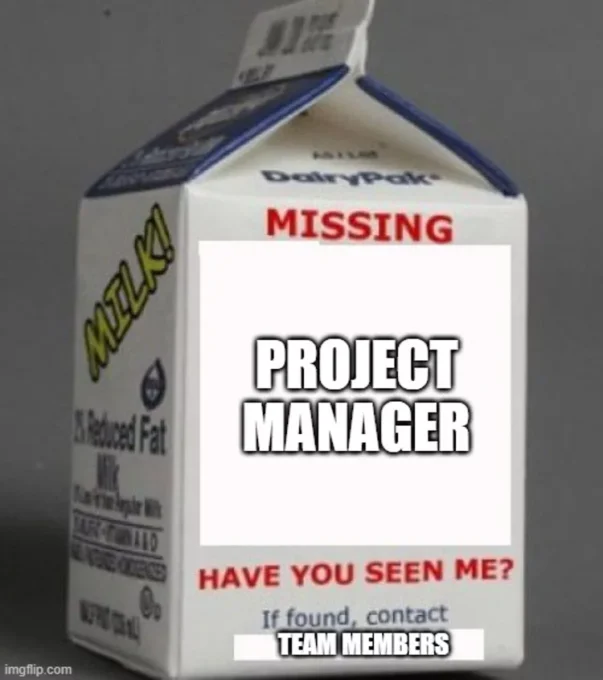In the world of project management, a methodology stands out like a sore thumb, and that’s the notorious ad hoc project management. Suppose you’ve ever had the misfortune of encountering a project managed in this haphazard manner. In that case, you’ll understand why it’s often the subject of derision and eye-rolling among seasoned project professionals. Ad hoc project management, or as I like to call it, “Project Mismanagement,” is a chaotic and ill-conceived approach that seems to thrive on confusion and disorganization.
Disclaimers
We do not counsel or advise any one method of conducting projects. According to our philosophy, project management professionals should select the approach commensurate with the assets, liabilities, risks, and objectives they’re working with. However, we can advise on the worst approach – NOT managing projects. If there is a project, and you are a project manager, then you should manage that project, but believe it or not, some select an approach that is contrary to managing a project. We are not suggesting that every formalized project artifact or plan be adopted and employed for every project. We recommend selecting the processes and artifacts best suited to your project’s circumstances, constraints, and risks.

HOPE Project Management vs. Ad Hoc
We differentiate HOPE Project Management from ad hoc. We characterize HOPE project management as a project manager who acts as if things will work out with little or no contribution from themselves. There may be some measure of formalism, but little tracking or attempts at interventions to control or influence the project. Ad hoc is a degradation further. There is a pretense of planning or control, with documents, artifacts, and processes at the would-be project manager’s disposal. Contrasting HOPE with ad hoc approaches, there will be no tool or process use. Few or no artifacts will be produced, and will not keep up with the project’s progress over time. So, without further adieu, let’s take a closer look at the hallmarks of Ad hoc project management and why it deserves all the ridicule it gets.
Lack of Planning
Ad hoc project management epitomizes “winging it.” Forget about creating a project plan, defining objectives, or setting realistic timelines. In the ad hoc world, it’s all about flying by the seat of your pants and hoping for the best. Lack of planning puts the “project manager” in an entirely reactive mode with no plan and no proactive considerations. There are times when fixed long-duration plans are not the preferred approach. Perhaps we would choose an Agile approach such as Scrum in those cases, not an entire abandonment of any project management principles.
Spontaneity Over Strategy
Ad hoc project management relies on impulsive decision-making and last-minute changes instead of carefully thought-out strategies and well-defined goals. It’s as if the project manager has a dartboard with project tasks and throws darts blindly to decide what comes next. Every seemingly “emergent” event results in course change without consideration for other potential emergent events. After all, we have not spent any time planning, we have no idea of what should be expected, and therefore, everything that happens is some emergent, unpredictable event and further, not our fault.
No Accountability
In ad hoc project management, no one seems responsible for anything. No Gantt chart, maybe, and perhaps likely, we may not have an action item list. Team members can do whatever they want, whenever they want, with no consequences. Deadlines? There is a deadline, and management will want that done early without understanding what constitutes “on time.” In other words, the “schedule” indicates, say, 50 weeks, but the schedule is more like a random number selected. The executives say you should be able to do that project in 35 weeks. How would anybody know? Accountability, who needs that? Accountability? That’s just a buzzword in the world of ad hoc. Random number in, random number out.
Communication Breakdown
Effective communication is the backbone of successful project management, but ad hoc project management actively discourages it. Team members are left in the dark, wondering what’s happening and who’s in charge.
Over-Reliance on Heroics
This one here is very damaging, not just short-term but also long-term. Instead of sound project planning and execution, ad hoc project management relies on the heroics of a few individuals who magically pull everything together at the last minute. It’s like watching a poorly scripted action movie where the hero saves the day without a logical explanation. As if that individual strain was not sufficient, we also get the stress of rework, which will impact the other projects in the future, as our team members are solving field problems, distracted from the future project work due to this volume of rework and addressing scope change.
Constant Firefighting
With ad hoc project management, you can forget about smooth sailing. It’s a perpetual state of crisis management. Every day feels like a never-ending soap opera episode with more twists and turns than a roller coaster. This is connected to the heroics: firefighters = heroes. Besides the rework and distraction from the next batch of projects, we expect our team members to work in an unsustainable way, chronically. Look, I am from the generation imbued with a strong work ethic – not as strong as those gone before, perhaps, but strong. Nowadays, people are expecting a better work-life balance, and if you do not provide it to them, somebody will, or you will wear your talent down to the point where performance and engagement may be degraded.
Wasted Resources
Ad hoc project management is a recipe for wasting time, money, and effort. With no clear direction or plan, resources are squandered on tasks that may be unnecessary. Let’s look at this from the perspective of Lean.
Lean management is a business methodology that’s designed to increase quality and efficiency by eliminating wasted resources like time, money, and effort. It also is sometimes referred to as lean production or lean manufacturing. Lean breaks down as:
- Muda- Waste in doing the work.
- Mura – Unevenness of operation-for example schedule or work pace.
- Muri – Overburdening of equipment or talent or both.
I would add talent; we do not want to waste precious talent and motivation.
- Defects lead to rework, and it is a waste of time and material, both forms of waste.
- Since we have not built out the dependencies of the work, there will be times when work teams may end up waiting for inputs, not knowing when these will arrive (no project schedule- Gantt chart).
- When we have not planned the work well, we will deliver items to the next work group, but they will not be available for processing the work. For example, the developers design but then turn that design over to the test and verification group. Not knowing when the work package would be available, the test group made no plans to test. Now, the testers are busy or unprepared for the work, similar to the lean area of overproduction.
Business Case
Nope. Maybe we have a budget as part of our quote; it may have originated from the sales staff, but is it connected to the work? We have a faint whiff of the costs, including any profit margin, with no understanding of the risk associated with the project. Perhaps we get lucky and make our margins, or maybe we lose and wonder why and how that happened.

Frustration, Apathy and Burnout
Team members subjected to the consequences of ad hoc project management often feel frustrated, stressed, and burnt out. They are at the whim of a constantly shifting project tide. A constant change in direction, with little focus, often random or coincidental. It’s demoralizing to work on a project with no rhyme or reason.
The Bottom Line on Ad Hoc Project Management
Ad hoc project management is a slapdash, disorganized, and ineffective approach that should be avoided at all costs. It’s the kind of management style that gives project management a bad name and leaves everyone involved scratching their heads in bewilderment. If you ever face an ad hoc-managed project, brace yourself for chaos, confusion, and unnecessary stress. It’s a perfect example of what not to do in the world of project management.
Related Content
Back to Basics: What is the Role of a Project Manager?
3 Ways to Align Strategy with Project Management Planning
Resource and Task Management in Microsoft Project
Elevate your project management skills and propel your career forward with an MPUG Membership. Gain access to 500+ hours of PMI-accredited training, live events, and a vibrant online community. Watch a free lesson and see how MPUG can teach you to Master Projects for Unlimited Growth. JOIN NOW







